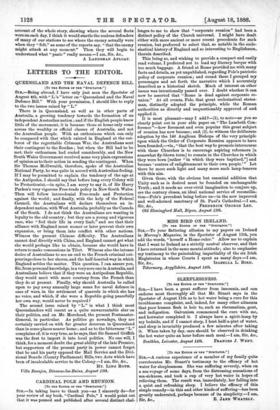CARDINAL POLE AND REUNION.
[To TIM EDITOR OP THE "SPECTATOR..")
Si,—In taking leave to thank you—as I sincerely do—for your review of my book, "Cardinal Pole," I would point out that it was penned and published after several distinct chal-
lenges to me to show that "corporate reunion" had been a. distinct policy of the Church universal. I might have dealt either with more ancient or more recent precedents for such reunion, but preferred to select that, so notable in the eccle- siastical history of England and so interesting to Englishmen,. therein described.
This being so, and wishing to provide a compact and easily read volume, I preferred not to load my literary barque with too much baggage. A friend at Rome provided me with many facts and details, as yet unpublished, regarding Pole's patriotic policy of corporate reunion ; and round these I grouped my personages and set forth the narrative which I accurately described as a historical sketch. Much of interest on other issues was intentionally passed over. I doubt whether it can now be asserted that "Rome is dead against corporate re- union." At all events, Pole, that great ecclesiastical states- man, distinctly adopted the principle, while the Roman authorities as directly and unquestionably approved of and. applied it.
It is most pleasant—may I add?—(1), to note—as you so clearly point out in your able paper on "The Lambeth Con- ference "—how foremost and even popular this great subject of reunion has now become; and, (2), to witness the deliberate- adoption by the 140 Anglican Bishops of the very principle upon which the Order of Corporate Reunion appears to have been founded,—viz., " that the best way to promote intercourse with those Churches is to encourage aspiring reformers [a somewhat fly-blown term] to remain in the Churches in which they were born [rather "in which they were baptised,"] and become centres of enlightenment to their own people.'" Let there be more such light and many more such lamp-bearers. with this aim.
Given these, with the obvious but essential addition that Unity such as is desired must be founded on unchangeable Truth ; and it needs no over-vivid imagination to conjure up, ere the century closes, an ideal national service of reconcilia- tion—Pole's precedent being before us—in the now improved. and well-adorned sanctuary of St. Paul's Cathedral.—I am,,


































 Previous page
Previous page